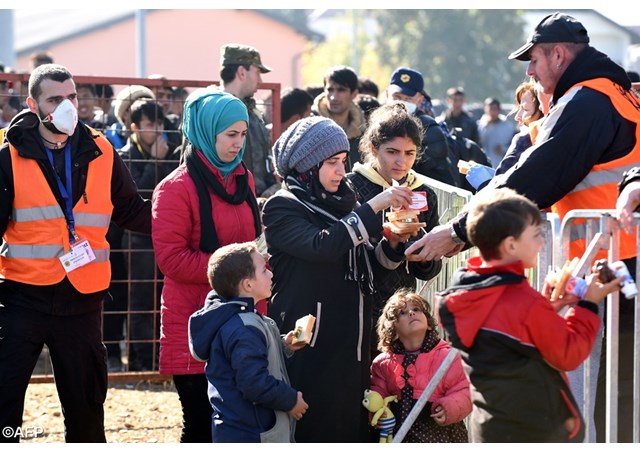
Slovenia urges help as 50,000 refugees arrive

(Vatican Radio) Slovenia says more than 50,000 asylum-seekers have entered the country in the last week since the flow of those heading toward Western Europe was diverted by Hungary's decision to close its border with Croatia. Local authorities are desperate and even consider to place a border fence like Hungary.
Listen to Stefan Bos' report:
On a field outside the Slovenian border village of Dobova, exhausted and hungry refugees are waiting when and if they will be forced to march to an already overcrowded refugee camp some 10 kilometres away.
Nearby, police claims they have used pepper spray to break up a scuffle between migrants in the Brezice camp.
Many of the refugees waiting near Dobova fled war-torn nations such as Syria and are now being confronted with riot police and hundreds of soldiers in this area.
The lucky view are able to get some clothing, food and water after scuffles with police. But many, including women breastfeeding their children, are without adequate aid.
Desperate aid worker
Palestinian aid worker Abdullah Hussein, who lives in Slovenia and now helps the UN refugee agency with translating, is desperate. "Yes this guy [who came to me] he has a baby one month old and he needs milk. His wife has no longer milk [to breastfeed her baby] because she has not eaten for days," he says.
"For me it is very sad what happens here and in their country. Because I am a Palestinian and I lived in the war for some 16 years. I know who the people are feeling."
Slovenia’s Prime Minister says the influx of tens of thousands of migrants is putting too much strain on his small Alpine nation of 2 million people and that his government may consider placing a similar anti-migration fence as nearby Hungary.
Police say 9,000 people have crossed from Croatia to Slovenia on Friday alone, while 11,000 still remaining in Slovenia’s several refugee centers.
Dangerous life
Syrian student Wart Arai, 20, still hopes to reach Germany after surviving in Syria."Suddenly you are walking in the streets and [bombs] fall from the sky and you die. Just as my relatives my friends," he recalls.
"I have a lot of relatives and friends who died [this way]," Arai adds.
And United Nations experts have urged Europe to continue accepting people like Arai.
They have warned that force won't stop Europe's migration crisis and will only fuel unscrupulous smugglers amid concerns over abuse of children travelling along the Balkan route.
| All the contents on this site are copyrighted ©. |


